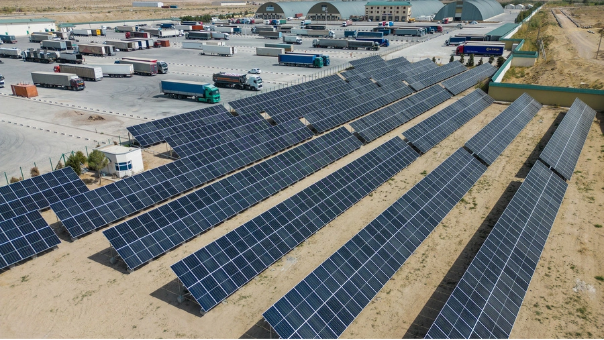LONGi supports humanitarian energy access through back contact technology in partnership with UNHCR

Date
July 9, 2025
read time
2
Minutes
Subscribe to the Press Newsletter
Contact info
Our friendly team would love to hear from you.
Nadine Bütow
Head of Corporate Communications, LONGi Distributed Generation Europe
nadinebuetow@longi.comLONGi’s global partnership with UNHCR, the UN Refugee Agency, continues to advance its mission of expanding clean energy access in humanitarian settings through high-efficiency back contact (BC) solar technology. Initiated in 2023 and now in its implementation phase (2024–2026), the three-year collaboration is focused on strengthening energy resilience, improving operational efficiency, and promoting sustainability in regions heavily impacted by displacement and limited infrastructure.
The initiative is part of LONGi’s broader commitment to promoting energy equity in developing and least developed countries, using advanced PV technologies to support long-term, climate-resilient humanitarian solutions.
Solar deployment strengthens humanitarian logistics in Uzbekistan
In November 2024, the partnership achieved a major milestone with the completion of a 700 kW solar power station at the Termez Humanitarian Logistics Centre in Uzbekistan. Donated and installed by LONGi, the system is expected to generate approximately 990,000 kWh of electricity per year, cutting carbon emissions by around 495 metric tonnes. The facility now benefits from a stable renewable energy supply, enabling more efficient storage, sorting, and distribution of relief goods during emergencies.

Pakistan hosts about 3 million Afghan refugees, many of whom face fragile socio-economic conditions and disrupted education systems. In 2024, the country declared an education emergency, with over 26 million children out of school—many of them refugee girls who additionally encounter cultural barriers, poor infrastructure, and financial hardship. Fewer than 2% of Pakistan’s GDP is invested in education, leading to under-resourced schools and high dropout rates, especially among girls in refugee villages.
In 2024, LONGi partnered with UNHCR to support 142 refugee-village schools in Pakistan. The initiative provided cash-based transport subsidies to 3,299 girls, achieving a 93% retention rate, and enabled 823 previously out-of-school refugee girls to enroll in public secondary education. Over-aged girls received literacy training, with most progressing to Grade 6. Digital learning tools—including laptops, tablets, and learning management systems—were introduced in all supported schools, benefiting over 56,000 students. The program also trained 919 teachers, including 375 digital master trainers. In parallel, LONGi supported the upgrading of school facilities with solar technology, focusing on improving access to education for displaced girls by removing infrastructure-related barriers and fostering more equitable learning environments.

Emergency shelter and aid delivered to Myanmar quake victims through UNHCR-private sector collaboration
In 2025, LONGi expanded its humanitarian engagement by supporting UNHCR’s emergency response efforts following a devastating 7.2-magnitude earthquake in Myanmar. The disaster caused widespread damage to housing and infrastructure, displacing thousands of people in urgent need of assistance. As part of its ongoing partnership with UNHCR, LONGi contributed to the rapid delivery of emergency shelter materials, essential supplies, and protection services for affected communities. The involvement underscored the role of private-sector partners in enabling swift, coordinated relief operations, and demonstrated how LONGi’s commitment to sustainable development extends beyond clean energy access into crisis response.
Looking ahead, LONGi and UNHCR plan to expand solar-powered infrastructure to additional regions, including projects in Africa focused on upgrading emergency storage hubs. By integrating reliable BC technology into humanitarian operations, the partnership is helping build cleaner, more resilient systems to support displaced populations worldwide.
